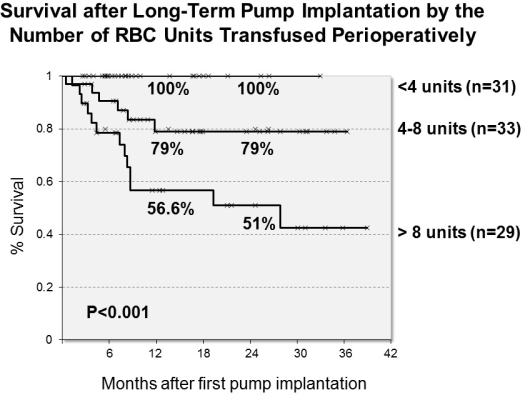The Impact of Perioperative Bleeding on Long-Term Outcomes of Mechanical Circulatory Support
1Sentara Norfolk General Hospital, Norfolk, VA
2Eastern Virginia Medical School, Norfolk, VA.
Meeting: 2015 American Transplant Congress
Abstract number: C178
Keywords: Heart assist devices, Outcome, Post-operative complications
Session Information
Session Name: Poster Session C: "Loss of Breath": VADs and Other Pre-Heart Transplant Matters
Session Type: Poster Session
Date: Monday, May 4, 2015
Session Time: 5:30pm-6:30pm
 Presentation Time: 5:30pm-6:30pm
Presentation Time: 5:30pm-6:30pm
Location: Exhibit Hall E
Purpose: Postoperative bleeding is a common complication of MCS surgery. The incidence of bleeding in published series exceeds by several times the 3-5% rates seen with other cardiac surgery. In this series we evaluated the impact of perioperative bleeding on outcomes of MCS surgery at our center.
Methods: We studied 93 consecutive recipients of de novo long-term MCS devices at our institution (89 HeartMate II LVAD, 2 HeartWare and 2 total artificial heart; 72% BTT and 28%DT) between 1/2010 and 11/2012 (73.5% male, 53% African American , mean age 54.9±13 yrs, 49.5% non-ischemic cardiomyopathy, 78.4% first sternotomy; 25% had concomitant cardiac surgery; mean cardiopulmonary bypass time 123 ± 59 minutes). Patients were followed until transplant, death or day of last observation on April 30, 2013. Mean follow-up 13.7 months (range:14 days to 3.2 years).
Results: The majority of patients (87%) required perioperative (intraoperatively and within 2 weeks from surgery) transfusion of red blood cell products (RBCP) for surgery related bleeding. For patients who required less than 4, 4-8 and more than 8 units of RBCP, the average hospital stay increased from 18, 26.5 to 38.2 days; the rates of hospitalization in rehabilitation unit for postoperative deconditioning increased from 7.1%, 30% to 58.3%; transplantation rates decreased from 43%, 29% to 16%, and one year survival on MCS support decreased from 100%, 79% to 56.6% (all p<0.001), respectively. There was no significant relationship found between the RBCP use and long-term risk of pump exchange or development of device-related infection. 
Conclusion: We showed a direct relationship between perioperative bleeding and long-term outcomes of MCS. Severe bleeding (> 8 units of RBCP) was associated with as much as 2-fold reduction of transplant and survival rates. Preoperative assessment of bleeding risk, optimization of heart failure, as well as careful intra- and postoperative management of hemostasis, are essential to successful MCS therapy.
To cite this abstract in AMA style:
Lietz K, Mooney M, Lakkis IEl, Derber C, Kelly U, Wilson C, Hoedt A, Bourassa P, Smith B, McGrath M, Herre J. The Impact of Perioperative Bleeding on Long-Term Outcomes of Mechanical Circulatory Support [abstract]. Am J Transplant. 2015; 15 (suppl 3). https://atcmeetingabstracts.com/abstract/the-impact-of-perioperative-bleeding-on-long-term-outcomes-of-mechanical-circulatory-support/. Accessed March 5, 2026.« Back to 2015 American Transplant Congress
